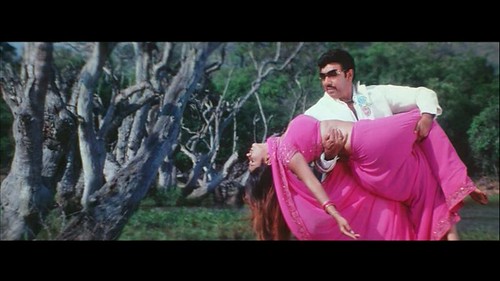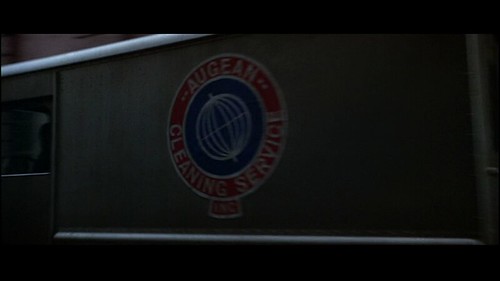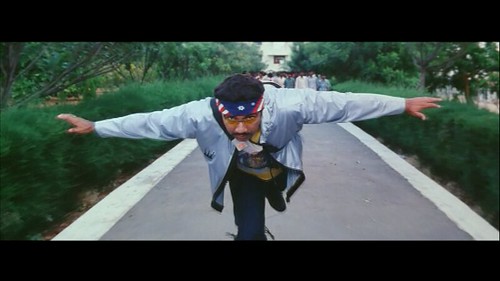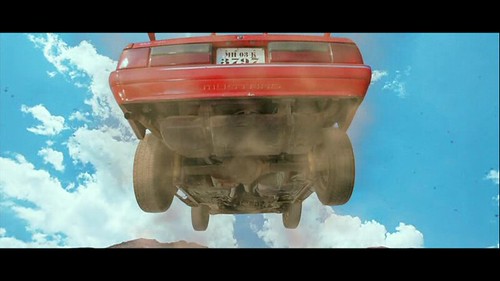
As the year draws to a close, it is time to unveil another gem from Englishkaran. The hour is ripe to introduce the heroine of the film's second half. Namitha's the name of Lady Lipids. She put a bikini to shame in Billa and returns in this film to challenge the limits of human acceptance of size, proportion and taste. Jiggles has a burning desire to win prizes in running. That little detail alone justifies that familiar disclaimer about stuff like this being works of fiction (no stretch is too much). We are treated to enough footage of her running and –- wait for it -- winning!!  Since she appears in a flashback that is crucial to tie up the loose ends about Sathyaraj's character (whom the title refers to, puTTan), it is not surprising that we have a romantic song and dance sequence featuring the two prancing about in domestic jungle-like setups (pages torn out of books like Rangeela). Given the rather obviously significant difference in size, it would make sense for Namitha to do the lifting and posing. However, convention requires the man to be the lifter, poser and support system for the female form. Consequently, we are treated to visuals of Sathyaraj doing his own stunts (supporting Namitha in various romantic poses) and of Namitha mooning the camera and challenging the widescreen format (on paper this must have been designed as a booty teaser for the lascivious laddies sitting in the dress circle). All this is accompanied by a song whose lyrics employ metaphors from war (the boy is compared to Mohammad Gazni -- who gave his name to two commercial potboilers exploiting anterograde amnesia; the girl and her assets are compared to bastions of defence). It's a strange howlarious mix that could cause you to choke on your lunch.
Since she appears in a flashback that is crucial to tie up the loose ends about Sathyaraj's character (whom the title refers to, puTTan), it is not surprising that we have a romantic song and dance sequence featuring the two prancing about in domestic jungle-like setups (pages torn out of books like Rangeela). Given the rather obviously significant difference in size, it would make sense for Namitha to do the lifting and posing. However, convention requires the man to be the lifter, poser and support system for the female form. Consequently, we are treated to visuals of Sathyaraj doing his own stunts (supporting Namitha in various romantic poses) and of Namitha mooning the camera and challenging the widescreen format (on paper this must have been designed as a booty teaser for the lascivious laddies sitting in the dress circle). All this is accompanied by a song whose lyrics employ metaphors from war (the boy is compared to Mohammad Gazni -- who gave his name to two commercial potboilers exploiting anterograde amnesia; the girl and her assets are compared to bastions of defence). It's a strange howlarious mix that could cause you to choke on your lunch.

Without much ado, oglers and gigglers, I present the transcript of the subtitles for this fascinating romantic romp
wage a war!
wage a war against the
eighteen year old fortress
overcoming all ups and downs
and passing over forests and hills
venture into the capital city, win over
the head lady and hoist the flag
let the ten fingers ignite
let the flowers bloom in this cannon
oh kattabomman!
come to pay the taxes
come to pay taxes with interest
there is still more
break the bones
make this volcano turn
into a 'cherapunji hill'
would vegetarian suffice for a lion?
can river cauvery be contained in a pot?
use the sari as the mast
to cross the 'river of lust'
you looted me without my knowledge
oh dear! take me to
the place never gone before
i would be with you like
a bow with an arrow
would whitewash the
never dawning night
suffocate me with kisses
why are you so stingy with desires?
oh gajini mohammad!
wage a war!
wage a war against the
eighteen year old fortress
in the beauty of...
cavalry would lose
seeing the footprints
the infantry would lose
at my wink, elephant troops
would become cat troops
soldiers would lose
at your smile
navy would lose
at seeing your navel
not an army but the eye arrows
are enough to defeat you
wind me with your eye keys
and satisfy me, oh dear!
issue an order with your hands and ignite
my dreams with the flowers in your tress
flowers are there, tress is there
snap and ask whatever you want
oh gajini mohammad!
wage a war!
wage a war against the
eighteen year old fortress
overcoming all ups and downs
and passing over forests and hills
venture into the capital city, win over
the head lady and hoist the flag
let the ten fingers ignite
let the flowers bloom in this cannon
let the ten fingers ignite
let the flowers bloom in this cannon

 We turn our lens to two other people on the cast roster. The first is la femme Madhumitha (for those unfamiliar with the South Indian fetish for the 'h' as a suffix, please read this as Madhumita). She plays a lass named Sandhya who bears the conventional undiscovered great voice (aka Shreya Ghoshal). For the first half of the film, she's also our heroine. She happens to sing a song surrounded by pastoral props and that song manages to make it to a CD that plays in the car of a famous music director named Deva played, dear attentive reader, by Deva himself. Deva is also the second person, who interests us today, because he also happens to be the music director of the film; put another way, dear reader with a nose of navel-gazing nods, Deva gets to pretend to be impressed by a voice carrying a tune that he composed. It comes with complete orchestration, of course -- something that, in the world of desii-wood, you get for free (especially in farms, fields, jungles and any other place that was chosen to host a ProTools exhibition). Of course, Deva appears pleased with the discovery and makes an attempt to sign the lass up (She don't look like no Shreya Ghoshal, but she shoor sounds like 'er).
We turn our lens to two other people on the cast roster. The first is la femme Madhumitha (for those unfamiliar with the South Indian fetish for the 'h' as a suffix, please read this as Madhumita). She plays a lass named Sandhya who bears the conventional undiscovered great voice (aka Shreya Ghoshal). For the first half of the film, she's also our heroine. She happens to sing a song surrounded by pastoral props and that song manages to make it to a CD that plays in the car of a famous music director named Deva played, dear attentive reader, by Deva himself. Deva is also the second person, who interests us today, because he also happens to be the music director of the film; put another way, dear reader with a nose of navel-gazing nods, Deva gets to pretend to be impressed by a voice carrying a tune that he composed. It comes with complete orchestration, of course -- something that, in the world of desii-wood, you get for free (especially in farms, fields, jungles and any other place that was chosen to host a ProTools exhibition). Of course, Deva appears pleased with the discovery and makes an attempt to sign the lass up (She don't look like no Shreya Ghoshal, but she shoor sounds like 'er).
 Watching it again was thus, in several ways, quite rewarding. I have also started noticing all those little details that excite trivia-mongers: licence plates, phone numbers (both fake and the unfortunately real), posters, marquees, commercial brands (subtle product placement) and little things that pop up in the wee corner of the frame. That annoying tic surfaced during the scene when a clean-up crew arrives to "dust" the American Literary Historical Society (the cover for a CIA hub whose crew lay dead). As the van passed I noticed the name of the company: Augean Cleaning Service Inc. Although clearly a front in the context of the film, the firm probably doesn't exist in real life (Google gave me nothing). If it's an invention for the film, it's a great one. Here's why. Augean clearly refers to the King Augeas in Greek mythology, most famous for his stables that housed the most cattle in the nation. These stables were never cleaned until Hercules got his famous assignment (the 12 Labours). The fifth labour was cleaning out these stables. Now you see why the name makes sense. Bravo.
Watching it again was thus, in several ways, quite rewarding. I have also started noticing all those little details that excite trivia-mongers: licence plates, phone numbers (both fake and the unfortunately real), posters, marquees, commercial brands (subtle product placement) and little things that pop up in the wee corner of the frame. That annoying tic surfaced during the scene when a clean-up crew arrives to "dust" the American Literary Historical Society (the cover for a CIA hub whose crew lay dead). As the van passed I noticed the name of the company: Augean Cleaning Service Inc. Although clearly a front in the context of the film, the firm probably doesn't exist in real life (Google gave me nothing). If it's an invention for the film, it's a great one. Here's why. Augean clearly refers to the King Augeas in Greek mythology, most famous for his stables that housed the most cattle in the nation. These stables were never cleaned until Hercules got his famous assignment (the 12 Labours). The fifth labour was cleaning out these stables. Now you see why the name makes sense. Bravo.
 Still, Englishkaran (loosely translated: English dude, aka अंग्रेज़ीवाला) had supposedly been a big commercial hit. Since successful mainstream cinema -- be it any flavour of देसीwood -- usually promises to be rather easy on the brain and high on vacuous ambition and a misplaced sense of greatness, this movie didn't seem like a bad alternative with a pinch of iodised salt.
Still, Englishkaran (loosely translated: English dude, aka अंग्रेज़ीवाला) had supposedly been a big commercial hit. Since successful mainstream cinema -- be it any flavour of देसीwood -- usually promises to be rather easy on the brain and high on vacuous ambition and a misplaced sense of greatness, this movie didn't seem like a bad alternative with a pinch of iodised salt. 










